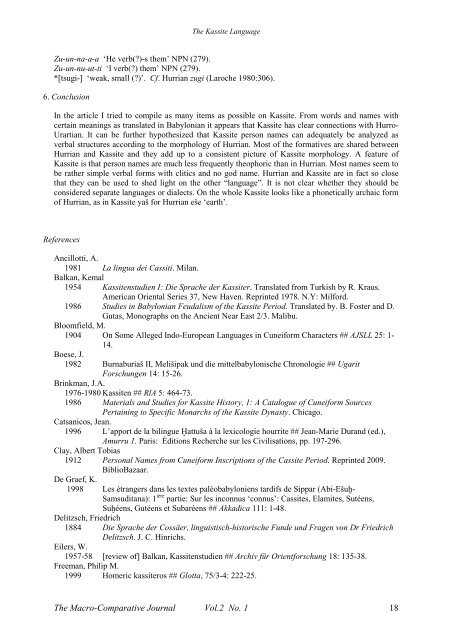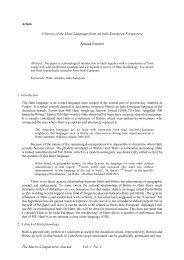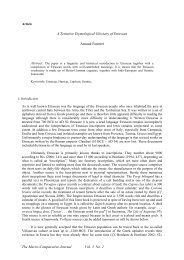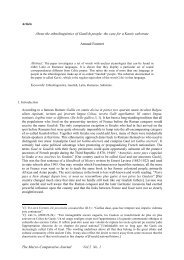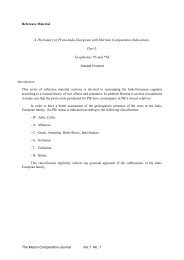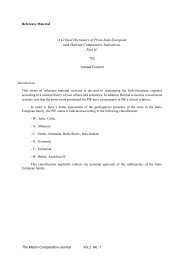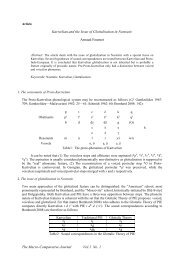The Kassite Language In a Comparative Perspective with
The Kassite Language In a Comparative Perspective with
The Kassite Language In a Comparative Perspective with
You also want an ePaper? Increase the reach of your titles
YUMPU automatically turns print PDFs into web optimized ePapers that Google loves.
<strong>The</strong> <strong>Kassite</strong> <strong>Language</strong><br />
Zu-un-na-a-a ‘He verb(?)-s them’ NPN (279).<br />
Zu-un-nu-ut-ti ‘I verb(?) them’ NPN (279).<br />
*[tsugi-] ‘weak, small (?)’. Cf. Hurrian zugi (Laroche 1980:306).<br />
6. Conclusion<br />
<strong>In</strong> the article I tried to compile as many items as possible on <strong>Kassite</strong>. From words and names <strong>with</strong><br />
certain meanings as translated in Babylonian it appears that <strong>Kassite</strong> has clear connections <strong>with</strong> Hurro-<br />
Urartian. It can be further hypothesized that <strong>Kassite</strong> person names can adequately be analyzed as<br />
verbal structures according to the morphology of Hurrian. Most of the formatives are shared between<br />
Hurrian and <strong>Kassite</strong> and they add up to a consistent picture of <strong>Kassite</strong> morphology. A feature of<br />
<strong>Kassite</strong> is that person names are much less frequently theophoric than in Hurrian. Most names seem to<br />
be rather simple verbal forms <strong>with</strong> clitics and no god name. Hurrian and <strong>Kassite</strong> are in fact so close<br />
that they can be used to shed light on the other “language”. It is not clear whether they should be<br />
considered separate languages or dialects. On the whole <strong>Kassite</strong> looks like a phonetically archaic form<br />
of Hurrian, as in <strong>Kassite</strong> yaš for Hurrian eše ‘earth’.<br />
References<br />
Ancillotti, A.<br />
1981 La lingua dei Cassiti. Milan.<br />
Balkan, Kemal<br />
1954 <strong>Kassite</strong>nstudien I: Die Sprache der <strong>Kassite</strong>r. Translated from Turkish by R. Kraus.<br />
American Oriental Series 37, New Haven. Reprinted 1978. N.Y: Milford.<br />
1986 Studies in Babylonian Feudalism of the <strong>Kassite</strong> Period. Translated by. B. Foster and D.<br />
Gutas, Monographs on the Ancient Near East 2/3. Malibu.<br />
Bloomfield, M.<br />
1904 On Some Alleged <strong>In</strong>do-European <strong>Language</strong>s in Cuneiform Characters ## AJSLL 25: 1-<br />
14.<br />
Boese, J.<br />
1982 Burnaburiaš II, Melišipak und die mittelbabylonische Chronologie ## Ugarit<br />
Forschungen 14: 15-26.<br />
Brinkman, J.A.<br />
1976-1980 <strong>Kassite</strong>n ## RlA 5: 464-73.<br />
1986 Materials and Studies for <strong>Kassite</strong> History, 1: A Catalogue of Cuneiform Sources<br />
Pertaining to Specific Monarchs of the <strong>Kassite</strong> Dynasty. Chicago.<br />
Catsanicos, Jean.<br />
1996 L’apport de la bilingue Ḫattuša à la lexicologie hourrite ## Jean-Marie Durand (ed.),<br />
Amurru 1. Paris: Éditions Recherche sur les Civilisations, pp. 197-296.<br />
Clay, Albert Tobias<br />
1912 Personal Names from Cuneiform <strong>In</strong>scriptions of the Cassite Period. Reprinted 2009.<br />
BiblioBazaar.<br />
De Graef, K.<br />
1998 Les étrangers dans les textes paléobabyloniens tardifs de Sippar (Abi-Ešuḫ-<br />
Samsuditana): 1 ière partie: Sur les inconnus ‘connus’: Cassites, Elamites, Sutéens,<br />
Suḫéens, Gutéens et Subaréens ## Akkadica 111: 1-48.<br />
Delitzsch, Friedrich<br />
1884 Die Sprache der Cossäer, linguistisch-historische Funde und Fragen von Dr Friedrich<br />
Delitzsch. J. C. Hinrichs.<br />
Eilers, W.<br />
1957-58 [review of] Balkan, <strong>Kassite</strong>nstudien ## Archiv für Orientforschung 18: 135-38.<br />
Freeman, Philip M.<br />
1999 Homeric kassíteros ## Glotta, 75/3-4: 222-25.<br />
<strong>The</strong> Macro-<strong>Comparative</strong> Journal Vol.2 No. 1 18


